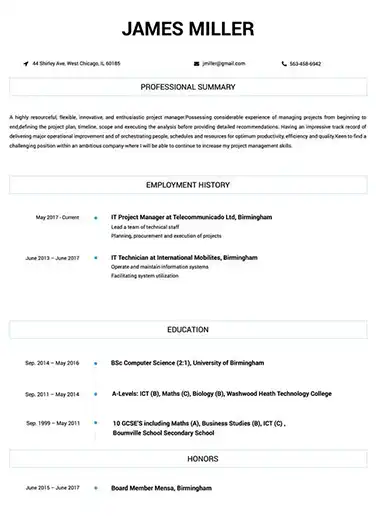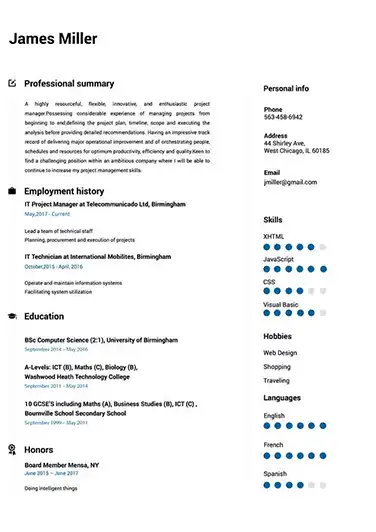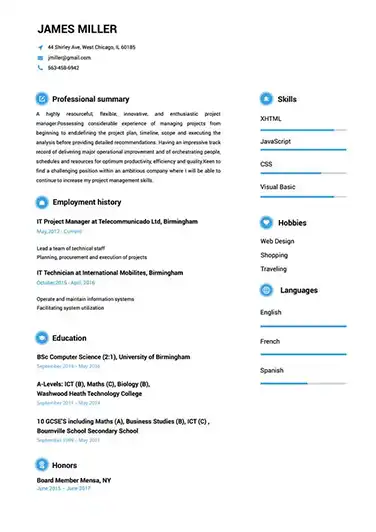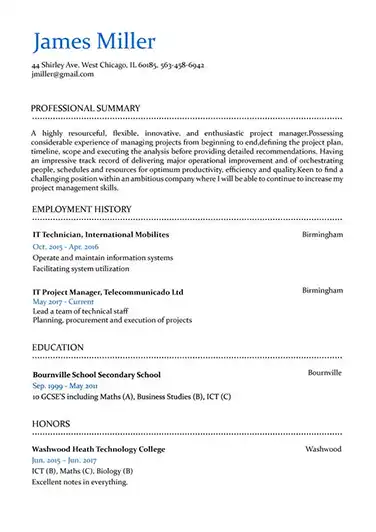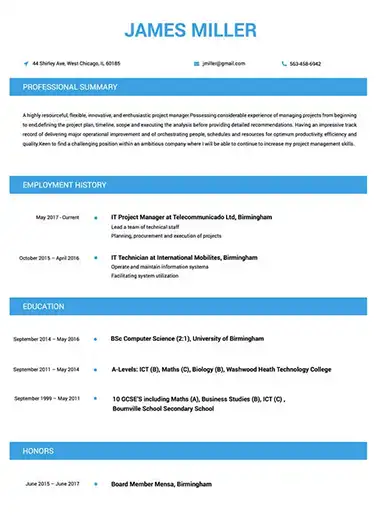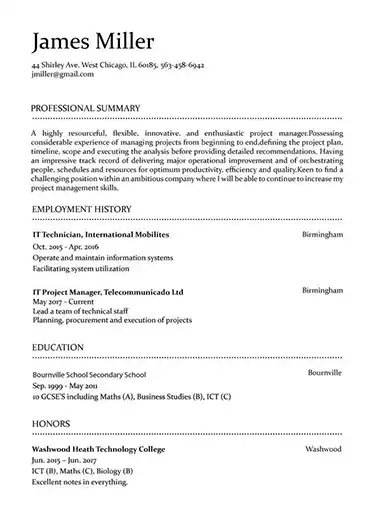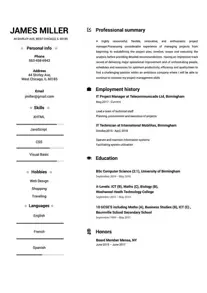 Use This Template
Use This Template
Build your resume in 15 minutes
Create an awesome resume that meets the expectations of potential employers with our selection of professional, field-tested resume templates.
accountant: Resume Samples & Writing Guide
bradmoore31@aol.com
941-333-0973
Employment history
- Prepare financial statements and reports
- Assist with financial audits and tax returns
- Perform financial forecasting and risk analysis
- Perform financial forecasting and risk analysis
- Participate in financial standards setting and in forecast process
- Prepare and review budget, revenue, expense, payroll entries, invoices, and other accounting documents
- Develop and document business processes and accounting policies to maintain and strengthen internal controls
- Analyze financial data and generate various financial models
- Maintain and reconcile ledgers and accounts
Education
Skills
Do you already have a resume? Use our PDF converter and edit your resume.
robhawkins@zoho.com
659-372-6077
Employment history
- Prepare and review tax returns and tax provisions
- Develop and implement internal controls and procedures
- Prepare financial statements and reports
- Participate in financial standards setting and in forecast process
- Provide technical support and advice on management
- Prepare financial statements and reports
- Prepare and review budget, revenue, expense, payroll entries, invoices, and other accounting documents
- Liaise with internal and external auditors
- Analyze financial data and generate various financial models
Education
Skills
davis_larry@yahoo.com
808-133-8160
Employment history
- Liaise with internal and external auditors
- Perform financial forecasting and risk analysis
- Prepare and review budget, revenue, expense, payroll entries, invoices, and other accounting documents
Education
Skills
vaughnhenry@zoho.com
939-235-7539
Employment history
- Develop and document business processes and accounting policies to maintain and strengthen internal controls
- Provide technical support and advice on management
- Liaise with internal and external auditors
- Research and resolve discrepancies and irregularities
- Prepare financial statements and reports
- Prepare and review tax returns and tax provisions
- Prepare and review budget, revenue, expense, payroll entries, invoices, and other accounting documents
- Maintain and reconcile ledgers and accounts
- Participate in financial standards setting and in forecast process
Education
Skills
edlewis@gmail.com
965-111-8130
Employment history
- Assist with financial audits and tax returns
- Develop and implement internal controls and procedures
- Maintain and reconcile ledgers and accounts
- Maintain and reconcile ledgers and accounts
- Monitor and review accounting and related system reports for accuracy
- Liaise with internal and external auditors
- Provide technical support and advice on management
- Prepare financial statements and reports
- Develop and document business processes and accounting policies to maintain and strengthen internal controls
Education
Skills
Not in love with this template? Browse our full library of resume templates
Does your resume stand out?
No, really stand out?
The truth is, if your resume doesn’t immediately catch the eye of recruiters, you’re likely to be passed over.
Preferably, within 7 seconds.
That’s the average amount of time a recruiter skims over your resume before deciding to toss or accept it, according to a study by job search site Ladders.
And that’s across every industry.
With 1.4 million accountants in the U.S. according to the U.S. Bureau of Labor Statistics, and standing as the 13th most popular profession, competition is thicker in accounting than most industries.
So, you need a resume that’s both visually pleasing and effective– making your unique selling points both clearly visible and easily digestible.
Not an expert resume crafter? No worries, we’ve got you covered.
Below, we’ll take you step-by-step through each section and key aspect of an accounting resume that hits all the right notes.
This guide is for you whether:
- You’ve just graduated and want to know how to put together an accounting resume that stands out from the pack, even if you don’t think you have enough experience to fill a page. Or;
- You’re an experienced accountant who is looking to amp up their resume and take it to the next level.
Your next job is only one resume away, so let’s get to it.
What this guide will cover
In this guide, you’ll learn how to put together an effective accounting resume that knocks the socks off of your next prospective employer.
We’ll cover:
- An accounting resume template better than 99% of what’s out there, right from the start
- How to format your accounting resume in a way that helps your unique selling points stand out– and gets you the interview
- How to write a resume objective or summary that immediately catches recruiter’s eyes
- How to write an effective accounting resume even if you have little or no experience
- And much more
Want to save time and energy crafting your next resume? You could spend hours formatting and styling your resume, or 5 minutes grabbing one of Resumebuild’s ready-made templates. Check out our full library of template examples here.
Let’s start with an effective and flexible accounting resume template example, which we’ll break down further as we go:
Resume templates
How to write an awesome accounting resume that gets you noticed
What makes an amazing accounting resume?
There are certain elements that every resume should have, like good formatting, a compelling objective or summary, and well-structured information so the most important elements stand out.
But within that, your resume needs to do a few key things that are unique to the accounting realm.
For one, certification is more important than in most other industries.
And numbers, in terms of actual results from your experience as an accountant (if you have any), are huge selling points that should be prominently put on display.
So, let’s jump into how to write an awesome accounting resume that doesn’t just get you noticed by recruiters, but lands you interviews– and helps you get the job.
1. How to format your resume so the “good stuff” rises to the top
With any good resume, you want to highlight your unique selling points (let’s call it your “USP”).
That might be that you’ve passed the CPA exam, that you had a good GPA in college, impressive results, or that you have valuable full-time or intern experience– especially if you’re early in your career.
The real task of crafting an effective accounting resume is this: how do I write my resume so that these unique selling points stand out?
As we talked about earlier, you only have a few seconds to get noticed by a recruiter.
So, you need to format your resume in a way that those key pieces of information jump out of the page and are the first things a recruiter sees when glancing over your resume (maybe the only thing).
In general, a basic chronological layout is suggested for accounting resumes.
Such as:
- Personal information
- Objective or summary
- Experience
- Education
- Certifications
- Skills
Why this layout? Because it presents the most logical and familiar flow of information.
If you were in fashion or a similar creative industry, you might want to do something else creative that would speak to your own creative or out-of-the-box thinking.
Accounting, however, is about attention to detail and clean professionalism, so a common chronological layout is typically best.
Let’s look at some examples of how to make your unique selling points stand out with this layout.
Example: Make your accomplishments stand out with bold font
One way to format your resume so that your USPs are on full display is through tactical use of bold font.
For example, you can place the most impressive bullet point for a particular employer at the top of your list and bold it to help it stand out, like in our example:
RIGHT
Senior Accountant
R&L Media – Los Angeles, CA – March 2016 – Present
- Managed client account holdings totaling over $32 million, while creating a reduction in costs totalling 13% annually
- Identified tax credits resulting in over $25,000 in annual tax savings
- Performed monthly accounts analysis and reconciliations
- Managed and train a team of in-house accountants
As opposed to this, where everything blends together and your real compelling, convincing elements are lost in a sea of text:
WRONG
Senior Accountant
R&L Media – Los Angeles, CA – March 2016 – Present
- Managed client account holdings totaling over $32 million, while creating a reduction in costs totalling 13% annually
- Identified tax credits resulting in over $25,000 in annual tax savings
- Performed monthly accounts analysis and reconciliations
- Managed and train a team of in-house accountants
Same information, same order, much different reading experience.
In the first example, “Managed client account holdings totaling over $32 million, while creating a reduction in costs totalling 13% annually” is bolded because it’s an impressive fact to point out.
It doesn’t just sound good, it’s based on real numbers.
When a recruiter is reading your resume, they’re looking to see what you can contribute if you were to fill the desired role within the company.
Data like that showing what you’ve been able to do for a previous employer is gold and should be made prominent.
Bold is a great way to intentionally lead the eye of your recruiter where you want it to go, whether it’s your CPA certification or results you’ve gotten for a past employer.
Example 2: Change the structure of information to make your strengths more prominent
Also, notice how the role, “Senior Accountant” in the example above is prioritized over the employer itself (and, again, in bold).
Recruiters are interested in knowing what roles and experience you’ve had, not, in most cases, the name of the company you worked for.
That’s why “Senior Accountant” is placed atop everything and in bold, with the company, location, and date as secondary details below it as well as the most notable point at the top of the bulleted list.
So, you could go with something like this:
WRONG
Ashford & Bankmen, Inc. – Burbank, CA
Senior Accountant – July 2012 – November 2014
But then the fact that you were a senior accountant gets buried under the name of the employer, which they’re not likely to care about.
Instead, use a format that puts your experience on display:
RIGHT
Senior Accountant
Ashford & Bankmen, Inc. – Burbank, CA – July 2012 – November 2014
Recruiters want to know what experience you have.
Do you have real experience as an accountant? In what capacity?
Oh, you were a senior accountant. Nice.
Unless the employer were some household brand that had the potential to offer clout through mention alone, the recruiter is going to care a lot more about what your role was, as they want to know your experience.
What if my best selling points aren’t my experience?
What if, however, you don’t have much experience (or any at all)?
What if your unique selling points have to do with a certification or a degree you’ve earned?
No one said experience had to show up first.
Instead, shuffle the sections around so that your strong points show up toward the top of your resume.
For example, if you’re a newly licensed CPA and you have a B.A. in accounting, but not much experience yet, instead of:
- Profile
- Experience
- Education
- Certifications
- Skills
You could do:
- Profile
- Certifications
- Education
- Skills
- Experience
Shuffling around our template example, that would look something like this:
Jen Davies
2456 North Erin Dr., Westwood, CA 90200
(562) 358 - 6011
@Linkedin.com/in/jendaviesacct
OBJECTIVE:
Licensed Certified Public Accountant with more than 7 years of experience. Possess a B.S. in accounting from a top-50 accounting school. Seeking to leverage my professional experience to level up your accounting system as a senior accountant with [COMPANY].
CERTIFICATIONS:
- Certified Public Accountant – November 2013
EDUCATION:
B.A. – Accounting
UCLA Anderson School of Management – Los Angeles, CA – June 2012
…
MUCH better.
Now, your strong points are on full display and will be the first thing a recruiter will notice when they scan your resume.
By structuring your resume in this way, you’re influencing how they remember you.
Remember, you’ve only got 7 seconds, so make it count.
One last thing: Your resume is a reflection of your personal brand
As an accountant, you might not always think of yourself as having a personal brand.
However, every high-level professional understands that when they present any piece of themselves, they’re communicating something: “This is who I am.”
That’s branding.
Beyond helping your unique selling points stand out, your resume as a whole needs to communicate a singular message: I’m a professional who is good at my job.
As an accountant, that means a few things:
- You’re good with numbers: Have any data on results you’ve gotten for your clients? Hard numbers are super effective for any accounting resume.
- You have a meticulous eye for detail: Typos are bad for any resume, but accountants are known for having a sharp eye. Go the extra mile and review and edit your resume multiple times to make sure all text, grammar, typo, and other mistakes and errors are cleaned up. Any small error (when noticed) will communicate to recruiters that you might not be the best person for the job. After all, if even your resume has a mistake on it, what does that say about your accounting skills?
So, after helping to make your unique selling points shine, take time to make sure your resume as a whole reflects your personal brand as a good accountant.
Any work you do to learn more about how to deliver a strong and cohesive personal brand will help throughout your career, so it’s worth investing a little time in it now.
2. What do recruiters look for?
With a better idea of how to structure your accounting resume to make sure your most powerful selling points stand out, you’re probably now wondering:
What do recruiters look for? What exactly should I display most prominently on my resume?
Maybe you’re not sure what your unique selling points are and you just want to know what recruiters want to see so you can make those the most identifiable elements in your resume.
Maybe you have a few good selling points, but you don’t know which you should prioritize.
Each recruiter is different. While one might favor education more heavily, another might not care much about that and just want to see your experience.
However, while those preferences will differ based on the recruiter, one thing is universally sought-after:
Results.
At the end of the day, recruiters want to see action. What kind of results have you accomplished for your previous employers? What responsibilities did you manage successfully?
That could be:
- Identified tax credits resulting in over $16,000 in annual tax savings
Or it could be:
- Reduced company costs by 18% annually through improving supply chain spend efficiency
Also notice that those bullet points are action-oriented.
“Reduced” and “Identified” are verbs: They’re actions you took to accomplish a result for your employer.
They show the recruiter that they can expect real, tangible action and results from you. And, when it comes to the hard numbers game of accounting, there really is no better selling point you could add to your resume.
What if I don’t have any results I can tout?
If you’re fresh out of college or don’t have any real results experience you can flaunt, there’s another way you can go about it that offers the promise of action.
Instead of showing results, show that you’re ambitious and ready to get to work.
One of the best places to do this is in your objective. In your objective, state that it’s your goal to use your experience and knowledge to get the employer results.
Instead of this:
WRONG
Seeking to leverage my professional experience and grow as a senior accountant.
Do this:
RIGHT
Seeking to utilize my professional experience to identify tangible operational and tax-related cost-savings as a senior accountant with Realm&Sands.
Now THAT’S more like it.
In the second example, you’re identifying super-specific action items that the employer is interested in and stating that it’s your goal to help them accomplish that objective.
And the great part is, you’re hitting them with that at the very top of the page, before they even glance at your (lack of/minimal) experience and education.
That means your objective is more likely to occupy the majority of their impression of you.
So far, we’ve broken down the keys to formatting an accounting resume and what recruiters are looking for (and how to give it to them, whether you have experience and results or not).
Now, let’s talk about some tips for maximizing the specific areas of your resume, including your objective/summary, experience, and skills.
3. How to write a resume objective that wows recruiters
Often the first thing listed on a resume after your name and basic contact information, an objective is a statement of your major professional goals as they relate to the employer.
Why would a recruiter care what your goal(s) are?
A good objective gives recruiters a glimpse into who you are. Written well, it can wow recruiters and make your resume memorable.
But before we get too far into how to craft a great objective, let’s talk about the difference between a summary and an objective and why you would use one vs. the other.
First, a basic breakdown:
- Resume objective: Express your ambition and passion. Good for: When you lack experience and tangible results.
- Resume summary: A short highlight reel of your professional experience. Good for: When you have lots of experience.
We’ll go into more detail in the next point on why you’d use a summary instead of an objective, but really they don’t have to be separate at all.
Within your profile section at the top of your resume, you can summarize some of your experience first then offer your objective at the end, effectively combining the two.
Of course, if you don’t have enough relevant experience to offer a full summary, you can just make it about the objective.
Plus, if your experience speaks for itself, you’ll probably want to highlight that and skip the objective.
Below and in the next point (where we break down a great summary), we’ll talk about both examples.
First, though, let’s talk about what makes a great resume objective that wows recruiters.
What makes a great resume objective?
A resume objective is one of the only places in a resume, and the best place, where you can use emotion to communicate part of who you are and leave a lasting impression.
Using an objective is ideal if you don’t have much experience and you want recruiters to know you’re serious about doing a great job.
A typical objective includes the following 3 pieces of information:
- A short summary of your experience
- And your education
- Plus your “objective statement” where you describe what you’d like to accomplish and in what role
Typically, a good objective isn’t more than 2-3 sentences.
It should be a quick and concise 1-2 sentence summary of your most notable experience and/or education along with your 1-sentence objective.
Don’t list out your whole resume in block-of-text form, like this:
WRONG
Certified Public Accountant with 6 years of experience. Experience with payroll, account analysis, account reconciliation, tax returns, collections, and most recently have experience training interns. B.A. in accounting from Sierra University, UT. Seeking to leverage my experience as a financial analyst to identify cost-savings for your organization.
Instead, jot down the highlights that will be most likely to impress recruiters.
For example, take this objective written for a recruiter who is looking for an accountant to help them reduce production costs:
RIGHT
Certified Public Accountant with 6 years of experience and a B.A. in accounting. Helped reduce costs by 11% annually at Windows Printables, my most recent employer. Seeking to leverage my experience as a financial analyst to identify cost-savings for your organization.
That employer might also need someone with payroll experience, but it doesn’t mean you should mention it here.
Instead, pick out the bits from your experience and education that will be most compelling and relevant based on what the recruiter states they’re looking for most in their job description.
You can mention the payroll experience later in your skills or experience section since it’s not of prime importance.
What if you don’t have much experience?
“That sounds great and all,” you say, “but I don’t have that kind of accounting experience or proven results I can reference.”
Fear not, for an objective is the perfect tool for any new accountant when done right.
For example, let’s take that same job post. If you don’t have specific experience reducing costs at a big organization, you could pull from experience managing the finances at the family business:
RIGHT
Dedicated entry-level analyst with a B.A. in accounting. Helped identify tax savings preparing a dozen tax returns over the past year. Managed business spending and analyzed financial reports for the family business over the past 2 years. Seeking to utilize my passion and enthusiasm for accounting to help your organization identify cost savings.
Can’t you just feel the passion?
They might not have the most experience, but that objective will help them stand out in a big way among an ocean of often bland and forgettable profiles.
That’s a whole lot better than giving it to them straight, like this:
WRONG
Junior accountant with a B.A. in accounting seeking an entry-level accounting position. No official experience yet, but I’m enthusiastic about helping your organization.
Just because you have no real experience doesn’t mean you need to go right out and say it.
Instead, use the first example as a framework and offer what you have that’s relevant to what they’re looking for.
Even if you only have one thing you can mention that shows the recruiter you could have the stuff to do the job they’re looking to fill, your chance of obtaining a response will increase ten-fold.
4. How to write a resume summary that highlights your selling points
As opposed to an objective which acts as a quick statement of your professional goals and intentions that shows a recruiter a bit about who you are, a summary offers a more complete view of you and your experience.
Why would you use one over the other?
While they’re not all that different from one another, you might choose to use a summary instead of an objective if you have extensive experience.
If you have the kind of experience that practically sells itself, a summary is a good way of leaning on that experience to impress recruiters right out of the gate.
Just remember: you want to keep it centered on hard numbers and real results. You don’t just want to spew your experience into a block of text:
Like this:
WRONG
Licensed Certified Public Accountant with an M.B.A. in accounting and 8+ years of experience. I’m skilled in bookkeeping, administrative account management, account reconciliation, and have experience training new accountants in small teams. Member NYSSCPA, AICPA.
Instead, list out your experience while emphasizing your results and the value you can bring:
RIGHT
Results-driven Certified Public Accountant with an M.B.A. in accounting and 8+ years of proven experience at large-scale firms. Created a reduction in costs for 3 of my last 4 employers, totalling 44% in annual cost reductions. Have managed over $48 million in account holdings.
That summary would blow any recruiter right off their seat.
If you feel like you don’t have the kind of experience that would allow you to write a compelling summary, use an objective at the top of your resume instead.
With an objective that expresses to recruiters your ambition and passion for accounting, you can show them that you’re serious about what you do.
5. How to write an accounting resume with little or no experience
Now that you’ve got an awesome objective or summary written, it’s time to move on to the bulk of most resumes: your experience section.
If you’ve got a lot of great experience, filling out this section won’t be very hard.
Just remember what we talked about earlier: format your experience section in a way that displays your experience and results prominently.
Make the header of each previous position the position you had, not the name of the company.
Plus, organize the bullet points based on hard numbers and results as much as you can.
You can even place the most impressive item at the top of the list and bold it to make sure recruiters don’t miss it.
“That’s great! But... I don’t have much experience.”
“In fact, I don’t even know if I can fill a whole page.”
No worries.
There are a few things you can do to make your experience section shine even if you’re limited by only 1 or 2 recent positions.
Let’s say you’ve had two previous accounting jobs and neither has resulted in any specific results you can reference.
This is how your experience might start out, thin and boring:
WRONG
Staff Accountant / Oct 2018 – Nov 2019
Treeholdings, Inc. – Ashford, CT
- Conducted quarterly financial audits
- Performed monthly accounts analysis and reconciliations
- Managed payroll and employee pay issues
Accountant / Jan 2018 – Sept 2018
Weirman’s Tires – Ashford, CT
- Analyzed and reconciled periodic financial reports
- Performed risk analysis using FRAP
But if you do a little digging, you can usually come up with a few more bullet points for that 1 or 2 jobs you’ve had to make up for the lack of job experience.
By listing out a few more bullet points under each position, you can fill the page and show a greater diversity of skills and experience in the process:
RIGHT
Staff Accountant / Oct 2018 – Nov 2019
Treeholdings, Inc. – Ashford, CT
- Conducted quarterly financial audits
- Performed monthly accounts analysis and reconciliations
- Managed payroll and employee pay issues
- Oversaw monthly budget
- Trained 3 interns during a Summer internship program
Accountant / Jan 2018 – Sept 2018
Weirman’s Tires – Ashford, CT
- Analyzed and reconciled periodic financial reports
- Performed risk analysis using FRAP
- Processed journal entries and maintained account records
- Successfully managed payroll for all 15-employee
- Took care of minor HR concerns
- Established the recording of all month-end financial activity
Oftentimes, if you think hard you’ll be able to come up with a few extra points you can mention to beef up your experience section to make up for a low number of previous positions.
In the example above, we added 6 additional line items, all relevant and sought-after, which will help take the place of a third job listing.
You also might not have relevant results you can cite.
However, mentioning things like how many employees you oversaw with payroll or the size of the budget of the business you managed are all decent replacements that lend some sense of credibility to your experience.
Plus, even if the position didn’t last that long, listing more bullet points looks more impressive, like you handled a large number of responsibilities while you were working there.
What if you have no experience at all
What if you’re fresh out of college and you haven’t even had your first job.
You could prioritize any certifications or degrees you have by formatting your resume with education at the top.
However, you’ll still want to get something you can list in your experience section if you have nothing at all.
Chances are, you have something you can mention along with a few relevant bullet points, like having helped manage the finances of the family business.
But if you don’t, here are some ways you can get more experience fast:
- Use your accounting skills to help during a volunteer event
- List a non-accounting job where you used accounting-related skills and make those your bullet points
- Get an internship
- Do free work for a friend or a local business
And the great part is, it really doesn’t matter if that experience was only for a month or two.
Just the fact that you have something you’re able to put down on the page that showed you applying your accounting skills is what counts.
6. Why listing achievements, like certifications and awards, is important for an accounting resume and how to use them
An extension of education, certifications– as well as any relevant achievements / awards– are a powerful way of standing out.
When it comes to accounting, certifications are a big selling point.
Especially if you’ve passed your CPA exam and can list that beautiful “Licensed Certified Public Accountant” on your resume.
But that’s just one example. You should list any and all of these specialized certifications if you have them:
- Certified Public Accountant (CPA)
- Certified Financial Analyst (CFA)
- Certified Management Accountant (CMA)
- Enrolled Agent (EA)
- Certified Internal Auditor (CIA)
- Certified Information Systems Auditor (CISA)
- Chartered Alternative Investment Analyst (CAIA)
Some industries can get away without listing certifications like this on their resume. For you as an accountant, it’s a big selling point that you don’t want to pass up.
Remember: Accounting is a competitive job space.
While there are typically more than enough accounting jobs to go around, there are also quite a few accountants (with the profession growing percent-wise each year) compared to other professions.
So, standing apart from the pack in any way you can is important.
To use those certifications or other achievements, you could list them under education, like this:
WRONG
EDUCATION:
- Certified Public Accountant – Nov 2016
- Slauson University – Seattle, WA
- B.A. / Accounting – June 2015
However, it’s a better idea to highlight those certifications in their own labeled section below or above “Education” and make a big deal out of them.
After all, you earned them:
RIGHT
CERTIFICATIONS:
- Certified Public Accountant – November 2016
Don’t stop there, though.
To use those awesome certifications to their full potential, you’ll want to place them in 3 different places of your resume:
- After your name in the header
- In your profile/summary/objective
- And in a separate “Certifications” section
If you have more than one certification to showcase, you can even consider moving that “Certifications” section up to the top of your resume.
That could be especially useful if your experience isn’t quite as impressive as your certifications, as we touched on earlier.
You spent the time and energy earning those specialized certifications. And, in terms of snagging interviews and a bigger salary, those certifications are gold.
So, get the most from them by making sure they’re prominent throughout your resume.
7. What skills should you mention? + How to do it right
Remember earlier when we talked about ways to fill up your resume even if you don’t have much experience?
Creating an impressive resume when you don’t have much experience is partly about formatting your resume to highlight your strong points, such as a good GPA, school, or certifications.
However, it’s also about figuring out what other information you can get down onto your resume to fill the page.
Why does that matter?
A good resume only takes up a single page. Point and period.
However, you want the page to look full, not empty, as that can send the wrong message to recruiters. (I.E. That you’ve got little experience and not much to offer, even if that’s not the case.)
One of those areas you can use to fill your resume even if you don’t have much accounting experience is the skills section.
That’s because you can pull from all kinds of hard and soft skills, such as:
- Accounts receivable
- Account reconciliation
- Payroll
- Account analysis
- Tax returns
- Collections
- Problem-solving
- Autonomy
- IT skills
- Time management
- Leadership
- Presentation skills
- Work well in a team setting
- Software-related experience such as Microsoft Suite and Quickbooks
However, it’s not enough just to mention your various hard and soft skills.
Why soft skills need to be placed in context
One of the biggest mistakes that accountants make when crafting their resume is to dump all of their soft skills into a bullet-point list and call it a day.
Like this:
WRONG
- Critical thinking
- Time management
- Leadership
Instead, you need to add an explanation that offers context to each of those soft skills.
For example:
RIGHT
- Used critical thinking to identify and lead a new initiative that uncovered $35,000 in annual tax savings.
- Optimized my time management at Baren Rentals to manage a total of 10 accounts simultaneously and $425,000 in assets
Instead of just spewing a bunch of skills onto your resume, you’re adding compelling value by drawing a connection between that skill and what you’ve used it to do at a previous employer.
And the great part about this is those 3 to 4 skills can easily take up 6-8 lines at the end of your resume, helping it appear fuller and you more valuable, when you may not have previously had enough to round out the rest of the page.
Whether you have extensive accounting experience or not, putting whatever skills you have into context shows recruiters that you actually have the skill and then uses it as yet another great selling point.
8. How to effectively list the technical skills you have experience with
Wait, does that same lesson apply to technical skills?
Fortunately and unfortunately, no.
Putting technical skills in context like what we did with the soft skills above wouldn’t make sense.
So, you don’t have to worry about that extra work.
However, taking the time to list out all of your relevant technical (especially software-related) skills is still important.
That’s partly because employers want to know you’re already versed in whatever program they’re using (or need you to use).
But it’s also important because most Applicant Tracking Systems (or ATS) via job boards online crawl your resume for certain tech skill-related keywords.
By mentioning things such as “Quickbooks” and “Sage” you’re giving your resume a better chance of appearing in searches.
Here’s a list of some of the software-related technical skills you can include on your resume:
- ORACLE
- Sage (Including Sage Intact, Business Cloud Accounting, and 50Cloud)
- Microsoft Excel / Microsoft Suite
- Quickbooks Pro / Enterprise
- Freshbooks
- Zoho
- Gusto
- Tipalti
- NetSuite
This is just a small list of the technical skills you can include on your resume. Any program or tool you’ve used in the past that’s relevant to your job is fair game here.
However, keep in mind: in the case of a 1-page PDF version of your resume you may occasionally send directly to employers, you might want to cut those technical skills down to the most essential.
Otherwise, you may have a hard time fitting everything onto one page.
Let Resumebuild take your resume to the next level
Now, you know everything you need to craft an incredible accounting resume.
We covered:
- How to format your resume so your best selling points are prominent
- What recruiters are looking for– and how to give it to them
- How to write a killer objective or summary that sets the tone for your entire resume
- How to write an accounting resume effectively even with little to no experience
- How to use certifications, achievements, and your skillset as additional selling points, instead of just those things you stuff at the end of your resume
Accounting is one of the most popular professions in the U.S.
But if you know how to stand out, you’re far above the pack.
Use the tips above to craft an amazing resume that leaves a lasting impression with recruiters and gets the phone calls rolling in.
Crafting the layout of the resume itself still takes a bit of work, though.
If you want to save time and energy formatting your next resume, check out Resumebuild’s resume template collection and builder.
You can choose from a large number of templates to find the perfect layout and style for you.
Drop your resume content in, add a few personal touches, and you’re all set.
Get started crafting your next best resume by checking out our full library of templates here.
accountant Job Descriptions; Explained
If you're applying for an accountant position, it's important to tailor your resume to the specific job requirements in order to differentiate yourself from other candidates. Including accurate and relevant information that directly aligns with the job description can greatly increase your chances of securing an interview with potential employers.
When crafting your resume, be sure to use action verbs and a clear, concise format to highlight your relevant skills and experience. Remember, the job description is your first opportunity to make an impression on recruiters, so pay close attention to the details and make sure you're presenting yourself in the best possible light.
accountant
- Filed tax returns and prepared governmental reports in compliance with strict standards.
- Analysed monthly balance sheet accounts for corporate reporting.
- Computed taxes owed by applying prescribed rates, laws and regulations.
- Reduced annual tax adjustments through better financial control.
- Suggested budgetary changes to increase company profits.
- Compute taxes owed and prepare tax returns, ensuring compliance with payment, reporting or other tax requirements.
- Maintain or examine the records of government agencies.
accountant
- Prepare taxation returns including partnership and company;
- Prepare quarterly BAS/IAS returns;
- Prepare monthly Payroll Tax;
- Prepare payroll tax, fringe benefit tax;
- Prepare and administer payrolls and payslips;
- Generate financial statements and facilitate account closing procedures each month.
- Maintain integrity of general ledger, including the chart of accounts.
accountant
- Survey operations to ascertain accounting needs and to recommend, develop, or maintain solutions to business and financial problems.
- Prepare and administering superannuation;
- Reconcile daily and monthly bank account;
- Inspect and operate internal risk control, including cash flow control, financial forecasting and risk evaluation;
accountant
- Research and resolve billing and invoice issues
- Verified transaction details, including funds availability and account balances
- Dealt with suppliers
- Collected financial data
- Performed other tasks required by the Accounting manager
accountant
- Proactively researched technical tax issues related to consulting projects.
- Advise management about issues such as resource utilization, tax strategies, and the assumptions underlying budget forecasts;
- Create periodic reports comparing budgeted costs to actual costs.
- Audit financial and superannuation information.
accountant Job Skills
For an accountant position, your job skills are a key factor in demonstrating your value to the company and showing recruiters that you're the ight fit for the role. It's important to be specific when highlighting your skills and ensure that they are directly aligned with the job requirements, as this can greatly improve your chances of being hired. By showcasing your relevant skills and experience, you can make a compelling case for why you're the best candidate for the job.
How to include technical skills in your resume:
Technical skills are a set of specialized abilities and knowledge required to perform a particular job
effectively. Some examples of technical skills are data analysis, project management, software proficiency,
and programming languages, to name a few.
Add the technical skills that will get hired in your career
field with our simple-to-use resume builder. Select your desired resume template, once you reach the skills
section of the builder, manually write in the skill or simply click on "Add more skills". This will
automatically generate the best skills for your career field, choose your skill level, and hit "Save &
Next."
- Data Entry
- Bookkeeping
- Financial Analysis
- Auditing
- Tax Preparation
- Account Reconciliation
- Financial Forecasting
- Budgeting
- Accounts Payable/Receivable
- QuickBooks
- Excel
- Cash Flow Management
- Cost Accounting
- Reconciliation
- Bank Reconciliation
- GAAP
- Internal Controls
- Payroll Processing
- Financial Modeling
- Accounts Analysis
- Regulatory Compliance.
How to include soft skills in your resume:
Soft skills are non-technical skills that relate to how you work and that can be used in any job. Including
soft skills such as time management, creative thinking, teamwork, and conflict resolution demonstrate your
problem-solving abilities and show that you navigate challenges and changes in the workplace
efficiently.
Add competitive soft skills to make your resume stand-out to recruiters! Simply select
your preferred resume template in the skills section, enter the skills manually or use the "Add more skills"
option. Our resume builder will generate the most relevant soft skills for your career path. Choose your
proficiency level for each skill, and then click "Save & Next" to proceed to the next section.
- Communication
- Interpersonal
- Leadership
- Time Management
- Problem Solving
- Decision Making
- Critical Thinking
- Creativity
- Adaptability
- Teamwork
- Organization
- Planning
- Public Speaking
- Negotiation
- Conflict Resolution
- Research
- Analytical
- Attention to Detail
- Self-Motivation
- Stress Management
- Collaboration
- Coaching
- Mentoring
- Listening
- Networking
- Strategic Thinking
- Negotiation
- Emotional Intelligence
- Adaptability
- Flexibility
- Reliability
- Professionalism
- Computer Literacy
- Technical
- Data Analysis
- Project Management
- Customer Service
- Presentation
- Written Communication
- Social Media
- Troubleshooting
- Quality Assurance
- Collaboration
- Supervisory
- Risk Management
- Database Management
- Training
- Innovation
- Documentation
- Accounting
- Financial Management
- Visualization
- Reporting
- Business Acumen
- Process Improvement
- Documentation
- Relationship Management.
How to Improve Your accountant Resume
Navigating resume pitfalls can mean the difference between landing an interview or not. Missing job descriptions or unexplained work history gaps can cause recruiters to hesitate. Let's not even talk about the impact of bad grammar, and forgetting your contact info could leave your potential employer hanging. Aim to be comprehensive, concise, and accurate.
Employment history
- Maintain and reconcile ledgers and accounts
- Perform financial forecasting and risk analysis
- Assist with financial audits and tax returns
- Analyze financial data and generate various financial models
- Liaise with internal and external auditors
- Develop and document business processes and accounting policies to maintain and strengthen internal controls
Education
Skills
Include your Contact Information and Job Descriptions
Missing job descriptions lessens your chances of getting hired.
Key Insights- Employers want to know what you've accomplished, so make sure to include descriptions for all of your previous jobs.
- Keep job descriptions short but don't just list your jobs.
- Never copy-paste a job description to post on your resume. Get inspired and use tools to help you write customized descriptions.
How to Optimize Your accountant Resume
Keep an eye out for these resume traps. Neglecting to detail your job roles or explain gaps in your career can lead to unnecessary doubts. Grammar blunders can reflect negatively on you, and without contact information, how can employers reach you? Be meticulous and complete.
dannywright@icloud.com
982-879-1803
Employment history
- Anaylze financail data and generate varoius financail models
- Research and reslove discrepencies and irregularties
- Maintian and recocile ledgers and accounts.
- Prepare and review tax returns and tax provisions
- Prepare and reviews budget, revenues, expenses, payroll entries, invoices, and other accounting documents
- Prepares financial statements and reports
- Liaise with internall and externall auditors
- Prepare financials statements and report
- Analyze financial datas and generate variouse financial models.
Education
Skills
Correct Grammar and Address Gap Years in Your Resume
Don't leave unexplained gaps in your work history.
Key Insights- When explaining gaps in your employment section, start by being honest.
- Elaborate on the gap and show that you never stopped learning.
- Explain and elaborate any gap in your work history by highlighting new skills.
accountant Cover Letter Example
A cover letter can be a valuable addition to your job application when applying for an accountant position. Cover letters provide a concise summary of your qualifications, skills, and experience, also it also gives you an opportunity to explain why you're the best fit for the job. Crafting a cover letter that showcases your relevant experience and enthusiasm for the Accounts Payable role can significantly improve your chances of securing an interview.
Moore bradmoore31@aol.com
941-333-0973
983 Sycamore Avenue, Iron Station, NC
28080
Ernst & Young
New York, New York
Dear Hiring Committee
I am a passionate Accountant with 10 years of experience in Accounting & Auditing. I am excited to submit my application for the Chief Accountant position at Ernst & Young, where I believe my skills and expertise would be a great asset to your team.
Throughout my life, I have pursued my passion for Auditing and sought out opportunities to learn and grow. My experience in Accounting & Auditing has given me valuable skills such as Financial Management and Coaching that have allowed me to improve professionally and personally. I am excited to bring these skills and my passion as a Accountant to the position and work with a team of like-minded individuals to achieve our common goals.
I am elated about the opportunity to join a team that shares my passion for this field, and values collaboration and innovation. I am confident that together we can overcome whatever tests and challenges are put on our way.
Best regards,
Brad Moore
941-333-0973
bradmoore31@aol.com
Brad Moore
Showcase your most significant accomplishments and qualifications with this cover
letter.
Personalize this cover letter in just few minutes with our user-friendly tool!
Related Resumes & Cover Letters

Build your Resume in 15 minutes
Create an awesome resume that meets the expectations of potential employers with our selection of professional, field-tested resume templates.

